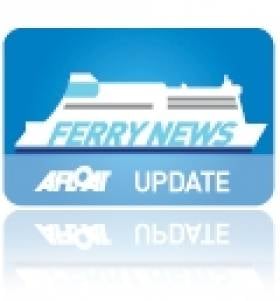Displaying items by tag: Belast Port
Irish Sea Cross Channel Fast-Ferry Services On Declining Trend
The third service between Belfast-Stranraer is in the hands of rivals Stena Line which maintain the HSS Stena Voyager (1996/19,638 grt) on sailings but only to around mid-November. She will be replaced by conventional sister-ships which will be introduced on the North Channel's newest port when services switch from Stranraer to a new terminal close to Cairnryan.
Finally the fourth fast-ferry is Irish Ferries marketed 'Dublin Swift' service which runs on the Dublin-Holyhead route served by Jonathan Swift (1999/5,989 grt). The craft built by Austal in Fremantle, operates alongside the conventional cruise-ferry Ulysses.
Stena Line's decision to terminate HSS Stena Explorer sailings between Dun Laoghaire-Holyhead this day last week follows fast-ferry Stena Lynx III's end-of-season Rosslare-Fishguard sailings earlier this month.
From next year, Dun Laoghaire-Holyhead sailings are to be seasonal-only and according to Stena Line they hope to resume fast-ferry sailings in April or May though no exact date has been set. Unlike the central corridor route which was entirely dependent on HSS operations, the Rosslare-Fishguard route remains operating year-round with the conventional ferry Stena Europe.
As a result of the discontinued fast-ferries, the HSS Stena Explorer is now spending a lay-up period in the Welsh port for the winter. The smaller Stena Lynx III is also 'wintering' but in on the opposite side of the Irish Sea in Dun Laoghaire, where the vessel has done so in previous years.
The lay-up of both fast-ferries in Dun Laoghaire and Holyhead is ironic considering that neither ports' are connected by the very craft that used to share sailing rosters in recent years. In addition the wintering of these catamaran craft is the first time that this has occurred since the pioneering Stena Sea Lynx fast-ferry launched such sailings in 1993.
This first 'Lynx' provided seasonal sailings on the route with conventional car-ferry Stena Hibernia, the former St. Columba, custom-built in 1977 for Sealink /British Rail. She was given a second name under Stena ownership, the Stena Adventurer and remained on the 57 nautical-mile route until replaced in 1996 by the year-round operated HSS Stena Explorer.
Apart from cross-channel fast-ferry services, the Isle of Man is served by the Isle of Man Steam Packet Co. Ltd's routes linking the islands capital Douglas with Belfast, Dublin, Heysham and Liverpool (Birkenhead) in the winter. These routes include seasonal services which are operated by a combination of conventional tonnage using Ben-My-Chree and fast-ferry Manannan (1998/5,089grt), a former US Navy vessel, to read more click HERE. For sailing schedules, vessel type deployed on route and for fares click HERE.
- Dublin Port
- Irish Ferries
- Dun Laoghaire
- Stena Europe
- Holyhead
- P&O Ferries
- Belfast Harbour
- Stena Line
- Larne
- Ports and Shipping News
- Ulysses
- P&O (Irish Sea)
- Cairnryan
- Ferry news
- Stena Explorer
- Stena Express
- FastFerries
- Cruiseferry
- Manannan
- Isle of Man Steam Packet Co.
- Stena Voyager
- Belast Port
- Isle of Man ferry services
- P&O Express
- Irish Sea fastferries
- Stena 'Lynx'
- BenMyChree
- Dublin Swift
- Stena Sea Lynx
























































